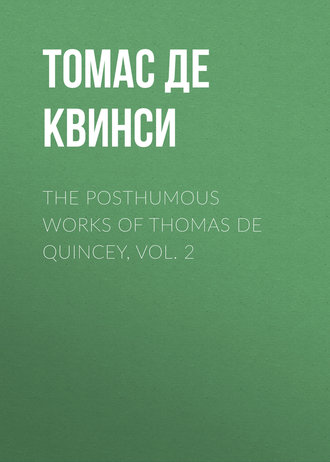 полная версия
полная версияThe Posthumous Works of Thomas De Quincey, Vol. 2
48
We speak here of Horace in his lyrical character, and of Pope as he revealed himself in his tender and pathetic sincerities, not in his false, counterfeit scorn. Horace, a good-natured creature, that laughed eternally in his satire, was probably sincere. Pope, a benign one, could not have been sincere in the bitter and stinging personalities of his satires. Horace seems to be personal, but is not. Neither is Juvenal; the names he employs are mere allegoric names. Draco is any bloody fellow; Favonius is any sycophant: but Pope is very different.
49
'His own chin,' chin-chopping, as practised in our days, was not an original invention; it was simply a restoration from the days of Queen Anne.
50
Valckenaer, in his famous 'Dissertation on the Phœnissæ,' notices such a dispute as having arisen upon the diction of Euripides. The question is old and familiar as to the quality of the passion in Euripides, by comparison with that in Sophocles. But there was a separate dispute far less notorious as to the quality of the lexis.
51
'One,' but in the Eddystone or other principal lighthouses on our coast there are two men resident. True, but these two come upon duty by alternate watches, and generally are as profoundly separated as if living leagues apart.
52
Amongst the Spaniards there is.
53
'The wicked Jew,' Josephus, as once I endeavoured to show, was perhaps the worst man in all antiquity; it is pleasant to be foremost upon any path, and Joe might assuredly congratulate himself on surmounting and cresting all the scoundrels since the flood. What there might be on the other side the flood, none of us can say. But on this side, amongst the Cis-diluvians, Joe in a contest for the deanery of that venerable chapter, would assuredly carry off the prize. Wordsworth, on a question arising as to who might be the worst man in English history, vehemently contended for the pre-eminent pretensions of Monk. And when some of us assigned him only the fifth or sixth place, was disposed to mourn for him as an ill-used man. But no difficulty of this kind could arise with regard to the place of Josephus among the ancients, full knowledge and impartial judgment being presupposed. And his works do follow him; just look at this: From the ridiculous attempt of some imbecile Christian to interpolate in Josephus's History a passage favourable to Christ, it is clear that no adequate idea prevailed of his intense hatred to the new sect of Nazarenes and Galilæans. In our own days we have a lively illustration of the use which may be extracted from the Essenes by sceptics, and an indirect confirmation of my own allegation, against them, in Dr. Strauss (Leben Jesu). The moment that his attention was directed to that fact of the Essenes being utterly ignored in the New Testament (a fact so easily explained by my theory, a fact so utterly unaccountable to his) he conceived an affection for them. Had they been mentioned by St. John, there was an end to the dislike; but Josephus had, even with this modern sceptical Biblical critic, done his work and done it well.
54
'Against flies'—whence he must have merited the anger of Beelzebub, whom Syrians held to be the tutelary god of flies; meaning probably by 'flies' all insects whatever, as the Romans meant by passer and passerculus, all little birds of whatsoever family, and by malum every fruit that took the shape and size of a ball. How honoured were the race of flies, to have a deity of the first rank for their protector, a Cæsar for their enemy! Cæsar made war upon them with his stylus; he is supposed to have massacred openly, or privately and basely to have assassinated, more than seven millions of that unfortunate race, who however lost nothing of that indomitable pertinacity in retaliating all attacks, which Milton has noticed with honour in 'Paradise Regained.' In reference to this notorious spirit of persecution in the last prince of the Flavian house, Suetonius records a capital repartee: 'Is the Emperor alone?' demanded a courtier. 'Quite alone.' 'Are you sure? Really now is nobody with him?' Answer: 'Ne musca quidem.'









